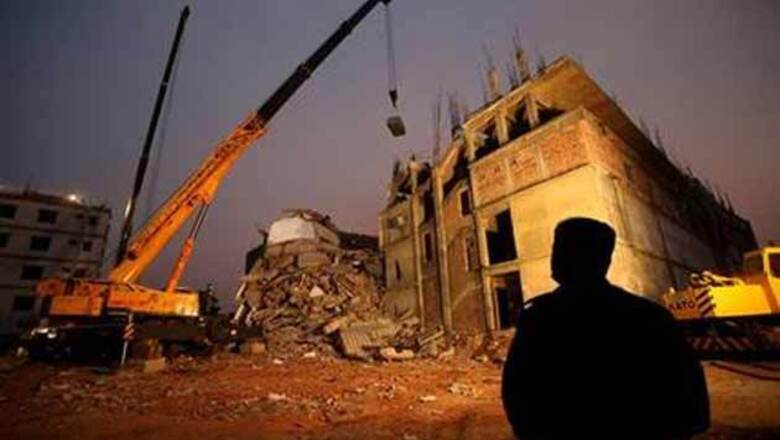
views
Dhaka: In the aftermath of a building collapse that killed more than 500 people, Bangladesh's garment manufacturers may face a choice of reform or perish. Home to five factories that supplied clothing to retailers in Europe and the United States, the shoddily constructed building's collapse has put a focus on the high human price paid when Bangladeshi government ineptitude, Western consumer apathy and global retailing's drive for the lowest cost of production intersect.
Police on Friday said that more than 500 bodies have been pulled from the wreckage of the eight-story Rana Plaza building that collapsed nine days ago, sparking desperate rescue efforts, a national outpouring of grief and violent street protests. Now, Bangladesh's garment manufacturers fear that a backlash has been set in motion that threatens fortunes and livelihoods in a business that employs more than 3 million people and accounts for about 80 per cent of the impoverished country's exports.
"It's a crucial time for us," said Atiqul Islam, president of the Bangladesh Garment Manufacturers and Exporters Association. "We expect our buyers to bear with us and help us to overcome the current crisis. It's not the time to turn away from us. That will hurt the industry and many of the workers will lose jobs." The most potent warning so far has come from the European Union, which said it could restrict Bangladesh's access to the crucial EU market if it fails to immediately take steps to ensure that basic labor standards are enforced.
The US is also reviewing Bangladesh's preferential trade status. Although garments are not included in the American trade preferences for Bangladesh, the loss of its special market access would further taint its reputation in the US, its second largest export market. Signs of dissension are also emerging among clothing brands and retailers who as a group have usually sought to distance themselves from industry disasters. But the retailers themselves are criticised by labour groups for allegedly shoveling blame and making token efforts to ensure worker safety.
A report by the AFL-CIO umbrella group of American unions published a day before the building collapse says retailers' intermittent factory inspections and corporate social responsibility reports have failed, and hold "eerie parallels" with the financial self-regulation that helped precipitate the global financial crisis.


















Comments
0 comment